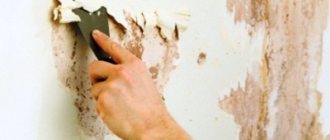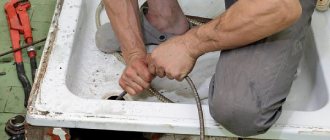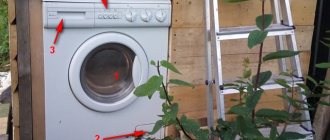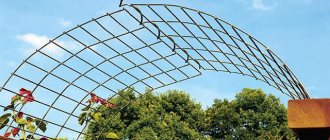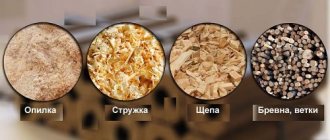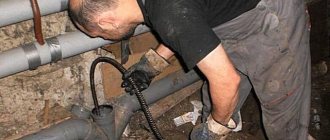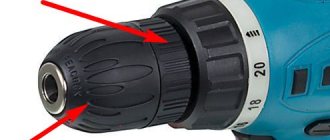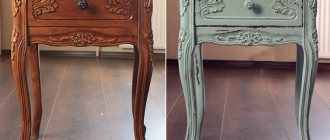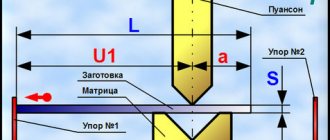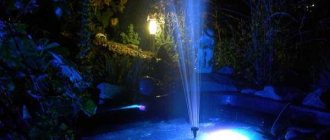Permanent formwork for the foundation is a single form for filling with concrete. Consisting of panels and reinforcement while remaining part of the finished concrete structure. Formwork performs the function of shaping concrete mortar, as well as waterproofing, thermal insulation and decorative finishing.
In this article we will tell you how to install permanent formwork for a foundation with your own hands according to the instructions. Let's look at what materials it is made from. Let's describe the advantages and disadvantages.
Types of permanent formwork for foundations
Permanent formwork is made from the following materials:
Metal
Metal formwork
Metal formwork is used for the construction of industrial facilities, as it has a high price. The thickness of metal sheets reaches from 0.7 to 4.0 mm. The sheets are connected to each other with anchors. Their number depends on the calculations. So that when pouring concrete, the sheets of metal formwork do not bend. The outer surface is protected by a coating (paint and lubricant) that prevents metal oxidation and ensures waterproofing of reinforced concrete.
Architects recommend using the material when creating rounded arches and complex geometric structures, as well as when installing foundations on complex loose soils.
Metal formwork has high resistance to deformation. And it has a low coefficient of moisture absorption, which creates a favorable environment for the aging of concrete. Making the concrete structure stronger.
Reinforced concrete blocks
Formwork made of reinforced concrete blocks
Formwork made of reinforced concrete blocks is used for large buildings. For example, when building a three-story house, reinforced concrete blocks have high strength and durability. For small structures, such strength will be unnecessary. Blocks with thin walls are suitable for constructing the base of a permanent fence.
Advantages of the material:
- allows you to save cement-sand mortar due to its structure;
- used in the construction of basements and interfloor ceilings;
- buildings constructed using this technology are provided with a service life of up to several hundred years;
- Reinforced concrete blocks do not require insulation of the house, since the material contains expanded clay (insulation).
Disadvantages of the material:
- The disadvantages of reinforced concrete blocks are their heavy weight and high price.
- The weight of blocks 510x400x235 reaches up to 30 kg (installed by workers with a crane).
Plywood
A formwork structure made of moisture-resistant plywood is used in the following cases:
- temporary structures;
- non-residential buildings;
- maximum savings on construction;
- when insulating the foundation along the external contour (if the plywood is protected from environmental influences).
Plywood requires careful handling due to its low strength and durability. In addition, the plywood sheets do not have grooves and ridges, so the structure is assembled with self-tapping screws, the joints are additionally sealed, and to prevent the plywood from sagging, an external sheathing with supports is assembled, which requires a lot of effort.
When water gets on non-waterproof plywood, it causes it to swell. And laminated does not form a monolithic wall, pushing away the concrete mixture. Therefore, plywood formwork is suitable as a temporary solution.
Arbolit
Wood concrete is a relatively new material consisting of cement mortar and wood chips. The mixture of materials is poured into a mold and formed into solid or hollow blocks.
Some blocks are insulated with stone wool or polyurethane.
Wood concrete formwork
Advantages of arbolite blocks:
- can be easily cut with woodworking tools, which allows you to adjust the blocks to the required dimensions;
- allow for quick installation without special equipment;
- have high strength, sound absorption and thermal insulation characteristics;
- quite fire resistant (up to 90 minutes of open fire);
- frost-resistant;
- Arbolite blocks are light in weight and cost compared to reinforced concrete.
Wood concrete formwork. Installation diagram.
The use of arbolite blocks for the foundation is undesirable, since the disadvantage of the material is water permeability. Will need to be protected from moisture.
Cement particle board
CSP, as the name suggests, is a variation of a mixture of cement and crushed wood. The difference from wood concrete is that in CBPB a different type of binder is used and sand is present.
Cement particle board
DSP is suitable for the construction of single-story and multi-story buildings.
The advantages of DSP are:
- good fire resistance;
- high strength;
- resistance to temperature changes, which means it is suitable for regions with a harsh northern climate;
- reliability and durability.
Cement particle board formwork
Expanded polystyrene
Expanded polystyrene formwork is suitable for the construction of buildings of simple shape, since the range does not yet have much variety.
Types of polystyrene foam formwork
A popular type of material for permanent formwork. The high demand for expanded polystyrene is due to a number of advantages of the material:
- light weight, as a result of which transportation of the material is greatly simplified;
- ease of installation thanks to the tongue-and-groove system;
- quick installation;
- variety of block types;
- high heat and sound insulation properties;
- expanded polystyrene blocks prevent the development of mold, since the material is biologically inert;
- Among the shortcomings, it is worth highlighting the lack of fire resistance and the non-environmental friendliness of the material.
Important! Formwork made of expanded polystyrene has low fire resistance and a degree of environmental friendliness. Therefore, when purchasing material with eco label, make sure that the formwork will not harm your health.
Glass magnesite
Glass-magnesite formwork is a structure made of lightweight SML material. The technology was developed in the mid-20th century to create thermally insulated houses.
Glass-magnesite formwork
Composition of glass-magnesite sheets: magnesium oxide and chloride, perlite, sawdust, fiberglass, polypropylene fabric.
Advantages of LSU:
- high thermal insulation characteristics;
- fire resistance;
- excellent moisture resistance.
Steklomaznesite is used for reconstruction of houses with weak foundations.
Flaws
These permanent structures for concreting have their disadvantages:
- a structure erected using permanent formwork cannot be rebuilt or reconstructed. When planning construction, especially individual construction, you need to take this feature into account and immediately approve the final design of the building. It is also important to accurately mark and immediately lay all communications at the time of pouring monolithic walls;
- It is very important to carefully adjust all blocks in such a way as to prevent breaks. Loose formwork will cause moisture to penetrate into the base and cause fungus to form. It is especially important to pay attention to this drawback for novice builders who assemble permanent foam formwork with their own hands;
- The main disadvantage is the impossibility of directly pouring the solution at temperatures below +5°C. There are also problems at high temperatures - in hot weather it will be necessary to additionally moisten the hardening solution;
- dense protection with polystyrene foam boards does not allow the walls to “breathe”. To correct this drawback, designers need to provide in advance for the installation of a forced-type ventilation system. Only this approach will help cope with the greenhouse effect indoors, while maintaining thermal insulation benefits.
Features and technical characteristics of the Velox system
Velox is a leading Australian brand of permanent formwork made from wood chips (95%) and cement (5%).
Peculiarities:
- a unique system that allows you to build a house from the foundation to the roof, including floors and walls;
- liquid glass with additives that envelops wood chips makes the material resistant to environmental influences;
- construction time is minimal;
- there is no need for additional insulation;
- high sound insulation characteristics;
- environmentally friendly materials.
Specifications:
- average density no more than 800 kg/m3;
- humidity 22%.
- thickness swelling over 24 hours is no more than 1.15%;
- water absorption in 24 hours no more than 32%;
- specific resistance to pulling out screws is not less than 1.3 kgf/mm;
- bending strength of at least 1.8 MPa;
- thermal conductivity coefficient 0.11 W/m °C;
- specific effective activity of natural radionuclides is not more than 27 Bq/kg.
Important points
Recommendations:
- The formwork must be durable. Violation of the requirement will lead to distortion of the wall geometry and the solution will leak out.
- Strictly maintain 0 vertical. If the permissible deviation is exceeded, the wall may collapse.
- The next tier must be poured quickly, otherwise delamination may occur.
- The mandatory use of reinforcement will make the structure more durable.
Technology is making it easier to build walls. Even inexperienced people can build on their own if they follow simple requirements.
A video showing how easy it is to use permanent formwork:
The final stage of work
After the slabs and internal fasteners are installed, the seams are sealed with cement or concrete mortar, and then plastered with a special compound. This will keep the cement laitance from leaking into the surrounding soil, which will prevent the concrete from becoming more brittle. If the thickness of the foundation is large enough, then in addition to screeds, supports are also installed.
Sometimes, in order to save time on installing supports, the formwork is simply covered with earth, which is wrong, because after the base has hardened, it is necessary to waterproof the DSP. Although the wooden parts were treated with a special anti-moisture compound, waterproofing is necessary to increase their strength.
DSP is a convenient way to install permanent formwork for a strip foundation, regardless of whether there will be a basement or ground floor. This method allows you to create not only formwork for the foundation of a house, but also for fence supports, gates or walls. The labor costs for its installation are much lower than those of conventional formwork, which is ideal for quickly creating the foundation of a private house.
Popular manufacturers and prices
Prices may vary depending on the region and seasonality, but for the most popular manufacturers the average cost will be:
- A straight wall block 50 mm thick produced by Mosstroy will cost about 500 rubles, a more complex corner element - 780 rubles. Additional elements cost about 30 rubles on average.
- The cost of standard blocks from Samara “ Thermomonolit ” will be 750-780 rubles. The higher price is justified - in addition to polystyrene, plastic is added to the formwork blocks, which gives the product increased strength.
- The most expensive blocks include those made in Moscow - their price reaches 2,500 rubles. But such a difference with standard products from other manufacturers is justified. Each element is covered with cladding in the form of artificial stone. Additional external finishing is not required for such material.
Basic system requirements
Materials for formwork systems of this type must meet the following requirements:
- mechanical strength to withstand the pressure of the concrete mixture and loads from the soil during operation;
- moisture resistance of the layer and tightness of joints;
- precise geometry of individual elements with a flat surface;
- long service life without changing technical characteristics;
- simple installation technology;
- relatively low cost.
It is also worth mentioning the necessary availability for purchase in regular market sales.
